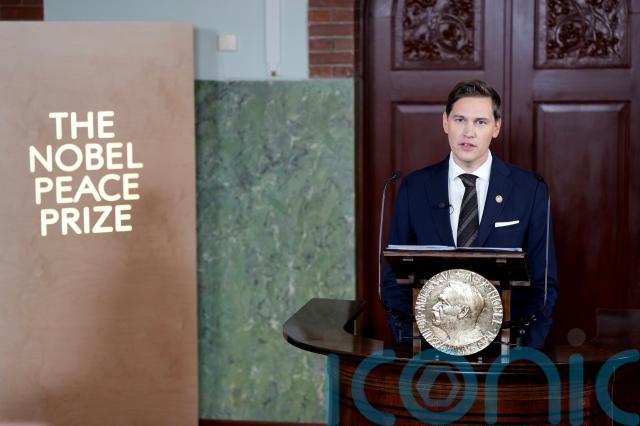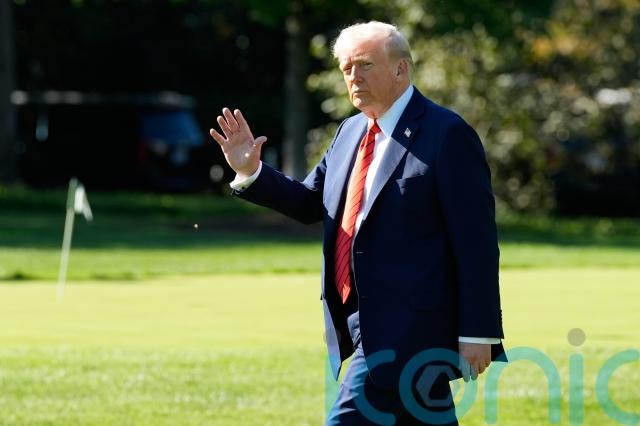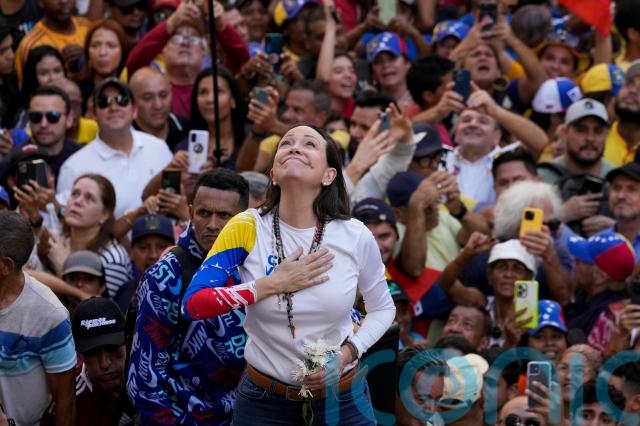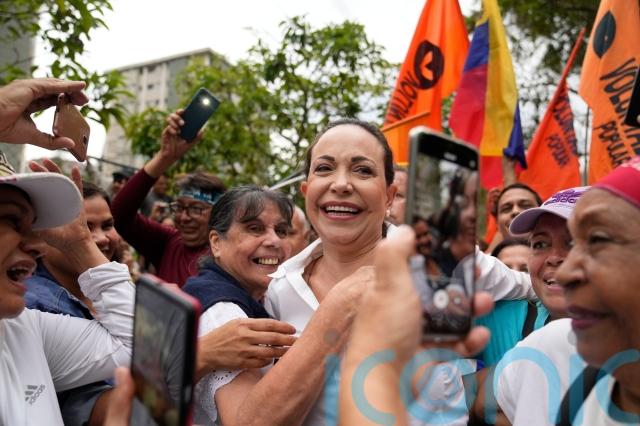
Maria Corina Machado of Venezuela has won the Nobel Peace Prize.
The opposition activist and former presidential candidate was lauded for being a “key, unifying figure in a political opposition that was once deeply divided – an opposition that found common ground in the demand for free elections and representative government,” said Jorgen Watne Frydnes, chairman of the Norwegian Nobel committee.
He added: “In the past year, Miss Machado has been forced to live in hiding. Despite serious threats against her life, she has remained in the country, a choice that has inspired millions.
BREAKING NEWSThe Norwegian Nobel Committee has decided to award the 2025 #NobelPeacePrize to Maria Corina Machado for her tireless work promoting democratic rights for the people of Venezuela and for her struggle to achieve a just and peaceful transition from dictatorship to… pic.twitter.com/Zgth8KNJk9
— The Nobel Prize (@NobelPrize) October 10, 2025
“When authoritarians seize power, it is crucial to recognise courageous defenders of freedom who rise and resist.”
Ms Machado’s ally, Edmundo Gonzalez, who lives in exile in Spain, posted video of himself speaking by phone with Ms Machado.
“I am in shock,” she said, adding, “I cannot believe it.”
Mr Gonzalez celebrated Ms Machado’s Nobel win in a post on X, calling it a “very well-deserved recognition for the long fight of a woman and of a whole people for our freedom and democracy”.
President Nicolas Maduro’s government routinely targeted its real or perceived opponents ahead of last year’s presidential election.
Ms Machado, who turned 58 this week, was set to run against Mr Maduro, but the government disqualified her. Mr Gonzalez took her place. He had never run for office before.
The lead-up to the election saw widespread repression including disqualifications, arrests and human rights violations.
The crackdown on dissent only increased after the country’s National Electoral Council, which is stacked with Maduro loyalists, declared him the winner despite credible evidence to the contrary.

The election results announced by the Electoral Council sparked protests across the country to which the government responded with force and ended with more than 20 people dead. They also prompted an end to diplomatic relations between Venezuela and various foreign countries, including Argentina.
Ms Machado went into hiding and has not been seen in public since January. A Venezuelan court issued an arrest warrant for Mr Gonzalez over the publication of election results. He went into exile in Spain and was granted asylum.
Last year, Ms Machado and Mr Gonzalez were awarded the European Union’s top human rights honour, The Sakharov Prize.
Ms Machado becomes the 20th woman to win the Nobel Peace Prize, of the 112 individuals who have been honoured.
There had been persistent speculation ahead of the announcement about the possibility of the prize going to US president Donald Trump, fuelled in part by the American leader himself, and amplified by this week’s approval of his plan for a ceasefire in the Gaza Strip.
Experts say the committee typically focuses on the durability of peace, the promotion of international fraternity and the quiet work of institutions that strengthen those goals.
Asked about lobbying for and by Mr Trump, Mr Frydnes said: “I think this committee has seen any type of campaign, media attention. We receive thousands and thousands of letters every year of people wanting to say what for them leads to peace.
“This committee sits in a room filled with the portraits of all laureates, and that room is filled with both courage and integrity. So we base only our decision on the work and the will of Alfred Nobel.”

White House spokesman Steven Cheung said in a post on X on Friday morning that “President Trump will continue making peace deals around the world, ending wars, and saving lives.” He added that “the Nobel Committee proved they place politics over peace.”
Mr Trump, who has long coveted the prestigious prize, has been outspoken about his desire for the honour during both of his presidential terms, particularly lately as he takes credit for ending conflicts around the world.
The Republican president has expressed doubts that the Nobel committee would ever grant him the award.
“They’ll have to do what they do. Whatever they do is fine. I know this: I didn’t do it for that. I did it because I saved a lot of lives,” Mr Trump said Thursday following the ceasefire agreement between Israel and Hamas.
Although Mr Trump received nominations for the prize, many of them occurred after the February 1 deadline for the 2025 award, which fell just a week and a half into his second term.
The White House did not comment directly on Ms Machado’s recognition.
However, when Ms Machado was included in Time magazine’s list of 100 most influential people in April, US Secretary of State Marco Rubio wrote her entry, describing her as “the Venezuelan Iron Lady” and “the personification of resilience, tenacity, and patriotism.”
Hours after Friday’s announcement, Ms Machado wrote on X that “today, more than ever, we count on President Trump, the people of the United States, the peoples of Latin America, and the democratic nations of the world as our principal allies to achieve Freedom and democracy.”
She added: “I dedicate this prize to the suffering people of Venezuela and to President Trump for his decisive support of our cause!”

Ms Machado, an industrial engineer and daughter of a steel magnate, began challenging the ruling party in 2004, when the non-governmental organisation she co-founded, Sumate, promoted a referendum to recall then-president Hugo Chavez.
The initiative failed, and Ms Machado and other Sumate executives were charged with conspiracy.
She drew the anger of Mr Chavez and his allies the following year for her Oval Office meeting with then-US president George W Bush. Mr Chavez considered Mr Bush an adversary.
Her full transformation into a politician would come in 2010, when she was elected to a seat in the National Assembly, receiving more votes than any aspiring MP ever.
Ms Machado sought Venezuela’s presidency for the first time in 2012, but she finished third in the race to be the presidential candidate for the Democratic Unity Roundtable.
The ruling party-controlled National Assembly ousted Ms Machado in 2014 and, months later, the Comptroller General’s Office barred her from public office for a year, citing an alleged omission on her asset declaration form. That same year, the government accused her of being involved in an alleged plot to kill Mr Maduro, who succeeded Mr Chavez after his death in 2013.
Ms Machado, a free-marketeer, denied the charge, calling it an attempt to silence her and opposition members who had called tens of thousands of people to the streets in anti-government protests that at times turned violent.
She kept a low profile for the next nine years, supporting some anti-Maduro initiatives and election boycotts and criticising opposition efforts to negotiate with the government.

By the time she announced a new bid for the presidency in 2023, her careful messaging had softened her image as an elitist hard-liner, allowing her to connect with sceptics on both sides.
She won the opposition’s presidential primary with more than 90% of the vote, unifying the faction — as noted by the Nobel Prize committee. But ruling-party loyalists who control the country’s judiciary kept her from appearing on the ballot, which forced her to throw her support behind former diplomat Mr Gonzalez.
She sought shelter in supporters’ homes and saw her closest collaborators be arrested as she kept campaigning across Venezuela. She repeatedly joined thousands of supporters chanting in unison “Freedom! Freedom! Freedom!” in rallies and asked them to vote for Mr Gonzalez.
Last year’s award went to Nihon Hidankyo, a grassroots movement of Japanese atomic bombing survivors who have worked for decades to maintain a taboo around the use of nuclear weapons.
The peace prize is the only one of the annual Nobel prizes to be awarded in Oslo, Norway.
Four of the other prizes have already been awarded in the Swedish capital, Stockholm this week — in medicine on Monday, physics on Tuesday, chemistry on Wednesday and literature on Thursday.
The winner of the prize in economics will be announced on Monday.
Subscribe or register today to discover more from DonegalLive.ie
Buy the e-paper of the Donegal Democrat, Donegal People's Press, Donegal Post and Inish Times here for instant access to Donegal's premier news titles.
Keep up with the latest news from Donegal with our daily newsletter featuring the most important stories of the day delivered to your inbox every evening at 5pm.